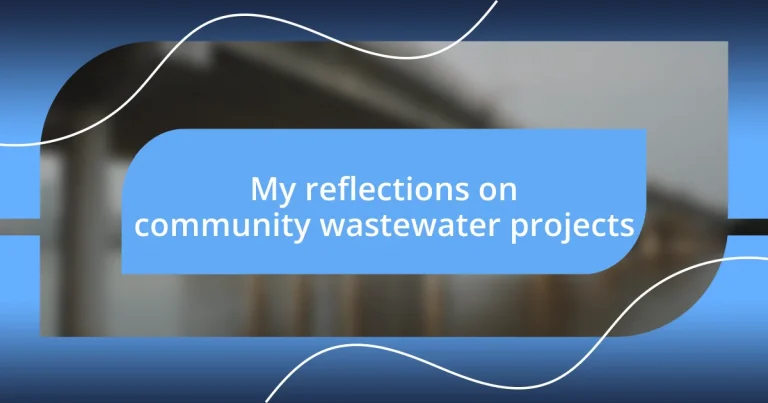Key takeaways:
- Community involvement is crucial for the success of wastewater projects, enhancing ownership and tailoring solutions to local needs.
- Implementing best practices like decentralized treatment systems and regular maintenance significantly improves project efficiency and community health.
- Future trends emphasize technological innovation and water reuse, shifting perceptions of wastewater from a burden to a valuable resource.
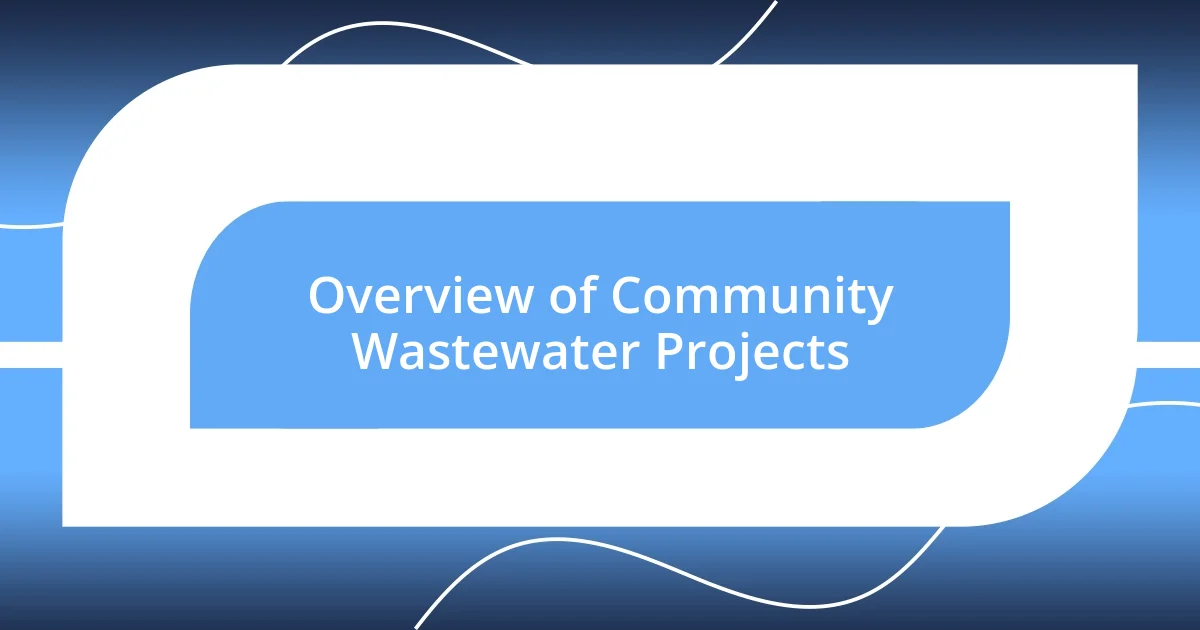
Overview of Community Wastewater Projects
Community wastewater projects are essential initiatives aimed at managing and treating sewage effectively within localities. From my experience visiting various communities, I’ve seen firsthand the difference these projects can make in improving public health and environmental sustainability. Imagine a town where raw sewage flows untreated; it’s a nightmare, isn’t it? Yet, when communities come together to implement proper wastewater management systems, the transformation is remarkable.
I recall a small village that once struggled with open drains and unpleasant odors. After their wastewater project was completed, the change was palpable. You could feel the pride in their voices when they spoke about it – no more worries about contaminated water or sewage overflow. These projects don’t just improve infrastructure; they foster a sense of community and shared responsibility. They make me wonder: how many other villages are missing out on this incredible opportunity?
Moreover, community involvement is pivotal in the success of these initiatives. By engaging local residents in the planning and decision-making processes, projects are more likely to meet the specific needs of the area. I’ve seen that when people feel ownership over the outcomes, the benefits last longer. Can you think of a better way to unite a community than through a project that enhances everyone’s well-being? It’s moments like these that truly highlight the power of collective action in addressing environmental challenges.
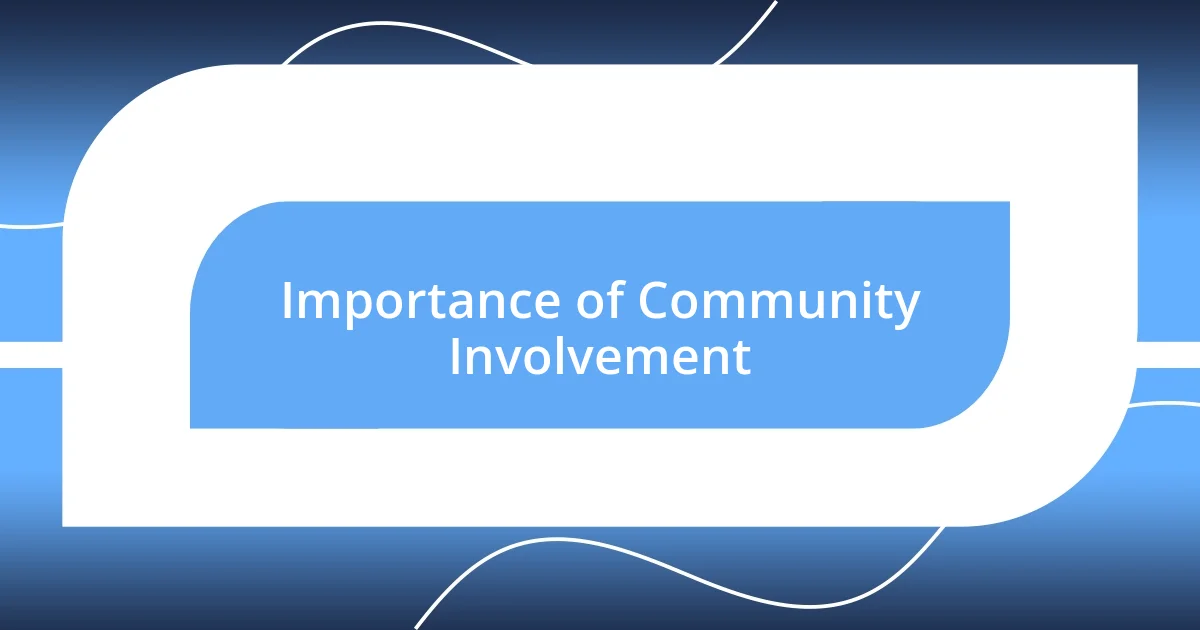
Importance of Community Involvement
Community involvement isn’t just beneficial; it’s crucial for the success of wastewater projects. When residents actively participate, they bring unique insights that can shape solutions to fit their needs. I remember attending a public meeting in one town where community members shared their concerns about high water tables. Their input directly influenced design changes, showcasing how the project could better serve everyone.
Some key reasons why community involvement matters include:
- Enhanced Ownership: Residents feel a personal connection to the project, motivating them to maintain and support it.
- Better Solutions: Local knowledge helps tailor projects to address specific issues that outside experts might overlook.
- Strengthened Relationships: Collaboration fosters trust among community members and with local authorities, creating a united front.
- Increased Awareness: Engaging residents raises awareness about the importance of wastewater management, helping them understand its impact on their daily lives.
Reflecting on different projects, I’ve found that communities that rallied together not only finished faster but also demonstrated lasting commitment. One community I visited became a model for others after successfully organizing regular clean-up days, showing their dedication went well beyond the project’s completion. Isn’t that what we all want—a community that thrives together, looking after each other through shared responsibility?
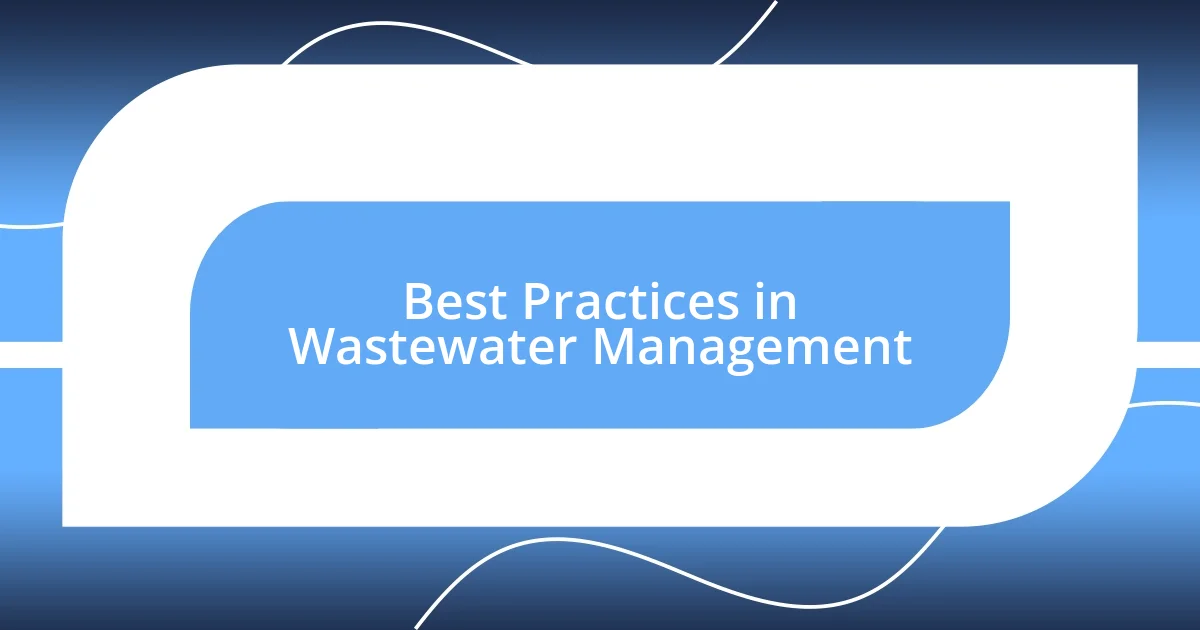
Best Practices in Wastewater Management
In wastewater management, implementing best practices can significantly enhance the efficiency and effectiveness of projects. One standout method I’ve observed is the use of decentralized treatment systems. These systems allow communities to manage wastewater locally, which means less strain on centralized infrastructure and faster response to local issues. I once visited a town that adopted this approach, and I could see how the smaller treatment facilities blended into the landscape, making them less intrusive and more acceptable to local residents. Their pride was evident—they didn’t just see a system; they saw a sustainable future.
Another crucial practice is regular maintenance and monitoring. I’ve learned that some communities schedule routine checks of their systems, which prevents larger, costly issues down the line. I remember talking to a maintenance worker who shared how a simple monthly inspection saved their village from a potential overflow disaster. This proactive approach ensures that wastewater facilities function at their best and that the community’s health remains safeguarded. It made me realize how a little diligence goes a long way in preserving both infrastructure and public confidence.
Finally, fostering partnerships with local businesses and organizations can amplify the positive impact of wastewater projects. In one instance, local schools collaborated with a wastewater treatment facility to create educational programs about the importance of responsible waste management. I saw the youths inspired to take action, discussing solutions amongst themselves. When different sectors come together, it creates a ripple effect of awareness and responsibility that benefits the whole community. Isn’t it inspiring how a simple collaboration can uplift an entire area?
| Practice | Benefits |
|---|---|
| Decentralized Treatment Systems | Enhanced local management, quicker response |
| Regular Maintenance | Prevents costly issues, ensures system reliability |
| Partnerships with Local Organizations | Increases community awareness and engagement |
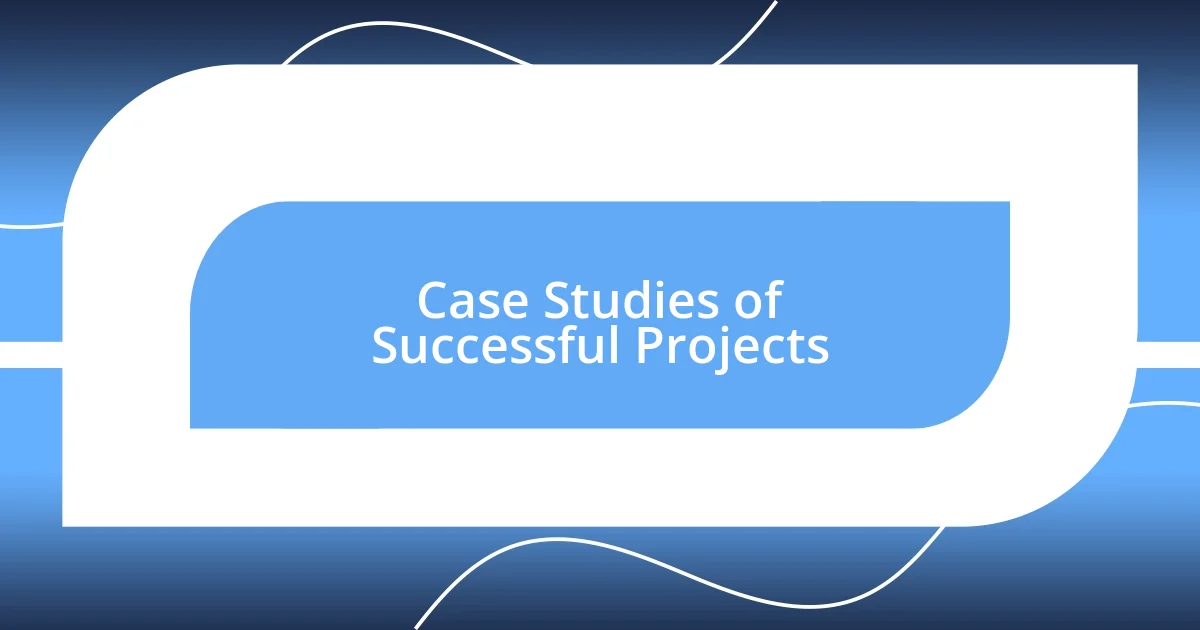
Case Studies of Successful Projects
One remarkable case study that stands out in my mind is a small coastal town that transformed its wastewater management approach after facing severe pollution challenges. They implemented a community-led project to restore nearby wetlands, which served as a natural filtration system. I vividly remember witnessing the community’s excitement as they participated in planting native grasses and installing buffers to protect the waterway—there was a sense of pride and environmental stewardship that I hadn’t anticipated. Isn’t it powerful when a community directly reclaims and revitalizes its natural resources?
Another project that really impressed me was in a rural area where residents faced contamination issues due to outdated infrastructure. The community organized workshops where they could voice their concerns and work with engineers to design a sustainable solution. I attended one of these sessions and saw firsthand how the residents, armed with newfound knowledge, collaborated effectively with experts. It was incredibly inspiring to see them taking ownership of the process, which paved the way for not just a new system but also a stronger bond among neighbors. How often do we get to witness such incredible growth and partnership in action?
On a larger scale, I’ve been following an urban initiative where partnerships between local businesses and city planners have turned the tide in wastewater management. For example, one local brewery joined forces with a treatment facility to recycle water in their operations. When I learned about this collaboration, I felt a surge of hope; it showed how innovation and community spirit could work hand-in-hand. By embracing sustainability, they not only reduced water usage but also engaged consumers in a conversation about responsible management. Isn’t it refreshing to see how one creative solution can inspire a collective shift in mindset?
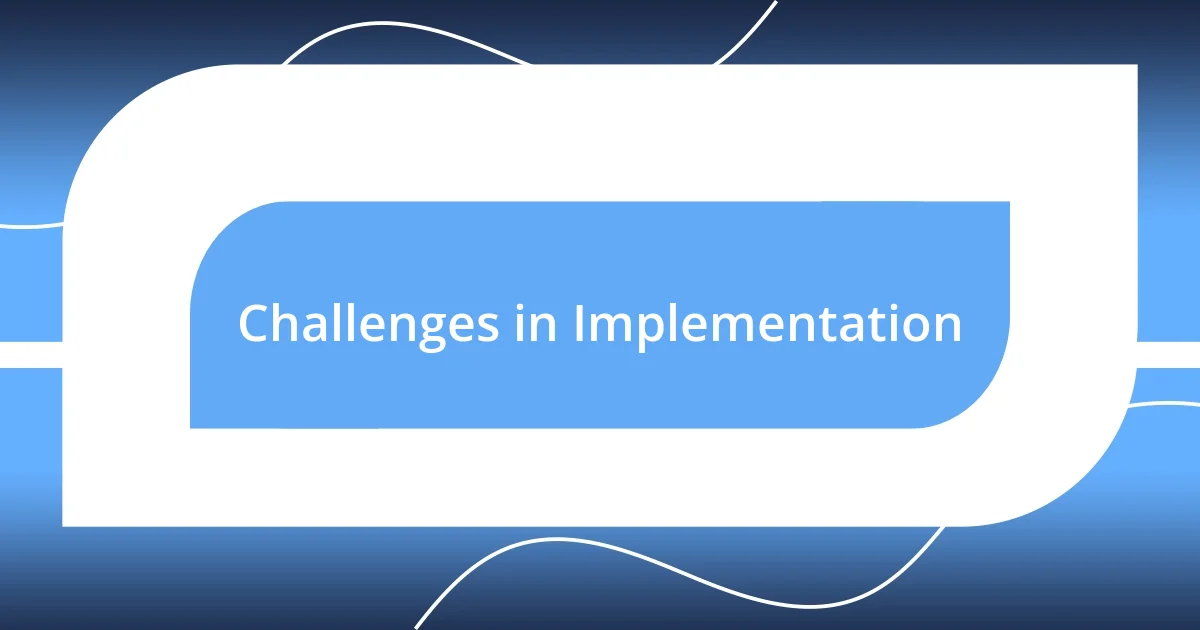
Challenges in Implementation
One of the key challenges I’ve encountered in implementing community wastewater projects is the level of community engagement. I remember attending a town hall meeting where many residents expressed skepticism about a proposed treatment facility. Their concerns stemmed from a lack of understanding about how the system would work and its benefits. How can projects succeed if the community isn’t fully on board? This experience taught me that effective communication is vital; without it, even the best plans can falter.
Another hurdle lies in securing funding and resources. I’ve seen many promising projects stall due to budget constraints. For instance, a small town I visited had a great proposal for upgrading their wastewater system, but when it came down to lining up financial support, the community was left scrambling. It made me realize how important it is to have diverse funding sources and to foster relationships with potential partners early in the process. Isn’t it frustrating when great ideas fizzle out just because money’s tight?
Lastly, navigating regulatory hurdles can be a major obstacle. I once spoke with a project manager who recounted their struggles with bureaucratic regulations that delayed their timeline for months. Each required permit felt like a brick wall, blocking progress and momentum. This made me reflect on how essential it is to have knowledgeable advocates who understand the regulatory landscape. Isn’t it ironic that sometimes, despite having a solid project plan, external complexities can hinder our steps toward progress?
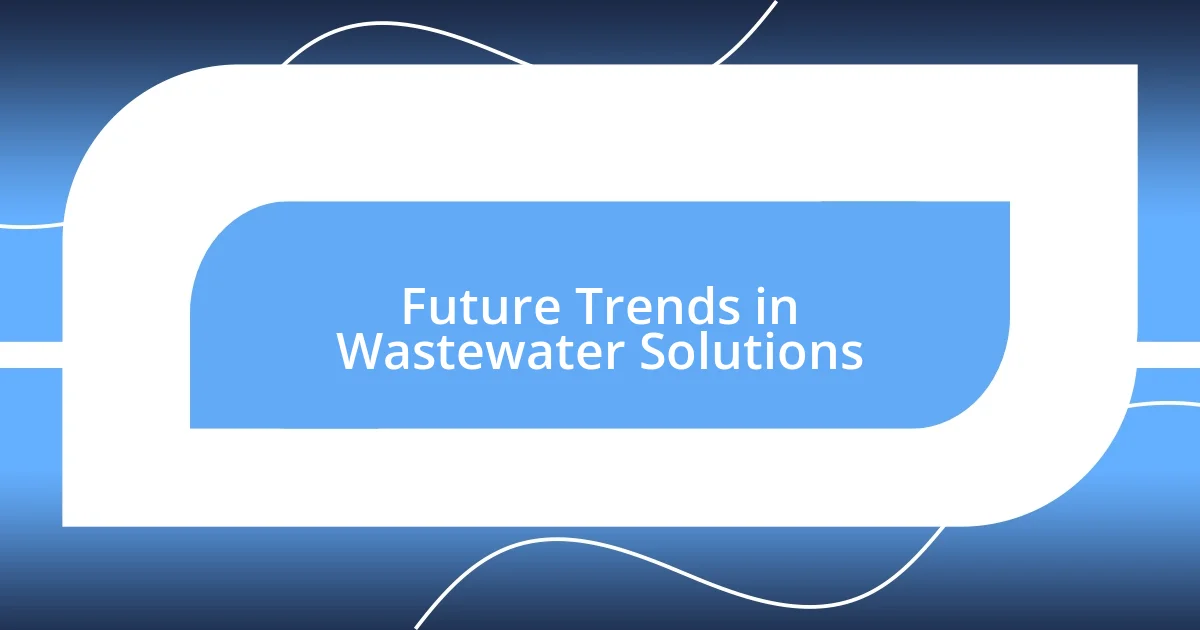
Future Trends in Wastewater Solutions
As I look ahead to the future of wastewater solutions, I can’t help but think about the role of technology. Innovative treatment methods, such as membrane bioreactors and advanced oxidation processes, are on the rise. I recently visited a facility utilizing these technologies, and the efficiency was astonishing—how amazing is it to think we can refine wastewater to a point where it’s nearly indistinguishable from freshwater?
Additionally, decentralized wastewater management is gaining traction. Instead of relying solely on large treatment plants, communities are exploring localized solutions that empower residents and take advantage of natural landscapes. I recall discussing this at a community forum, where passionate attendees shared their ideas about rain gardens and constructed wetlands as part of a decentralized approach. Isn’t this shift toward smaller-scale, community-oriented systems refreshing in a world often dominated by big infrastructure?
Lastly, I feel strongly about the growing emphasis on water reuse. More and more cities are adopting policies that promote the recycling of wastewater for non-potable uses like irrigation and industrial processes. During a recent workshop on sustainability practices, I was struck by how many participants were eager to integrate greywater systems into their homes. It made me ponder: what if we viewed wastewater not as a burden, but as a valuable resource? This mindset shift could revolutionize our relationship with water, and I’m genuinely excited to see where this trend takes us.
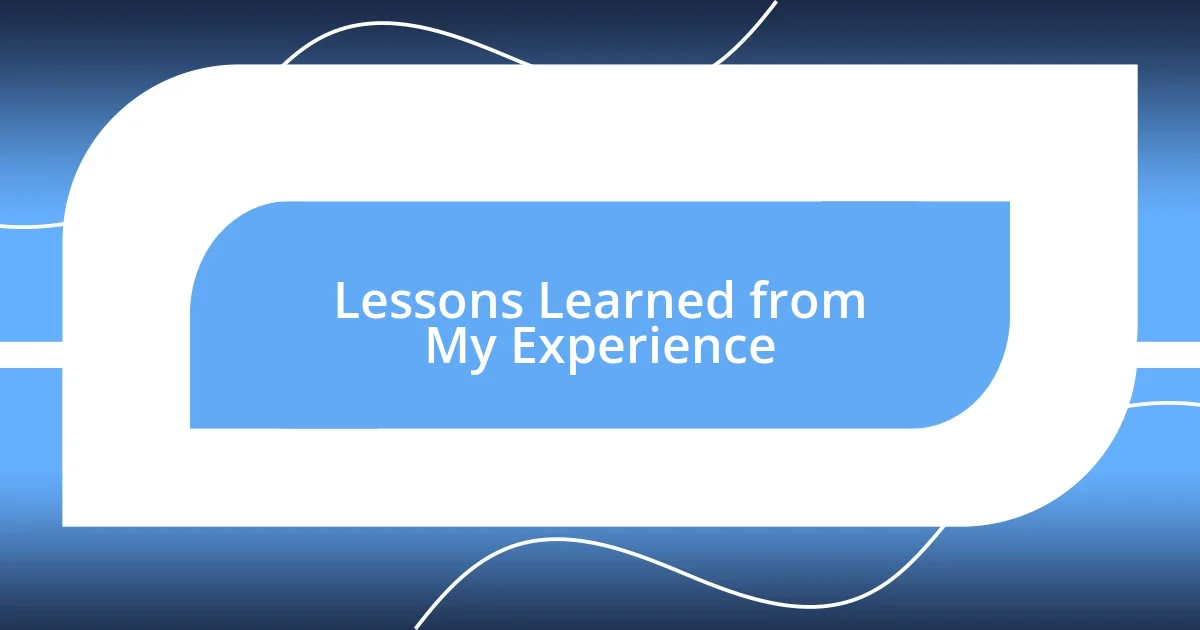
Lessons Learned from My Experience
Reflecting on my experiences with community wastewater projects, I’ve learned that patience is key. During one initiative, I encountered a particularly resistant group of stakeholders. After many discussions, I realized that building trust takes time. How often do we rush solutions only to face pushback later? This taught me the value of listening and allowing space for dialogue before jumping into action.
Another significant lesson was the power of collaboration. In a project where I partnered with local environmental groups, the diversity of perspectives was invaluable. I remember one brainstorming session where someone suggested an educational campaign that turned out to be a game-changer. Have you ever noticed how fresh ideas emerge when people feel heard? That experience made it clear to me that engaging a variety of voices not only enriches the project but also fosters community ownership.
Lastly, I discovered the importance of celebrating small wins along the way. I recall the day a neighborhood successfully implemented a composting initiative alongside the wastewater project. The excitement was palpable, and it invigorated further participation. Isn’t it vital to recognize progress, no matter how small? This taught me that acknowledging these milestones can keep motivation high and remind everyone of our shared goals.












